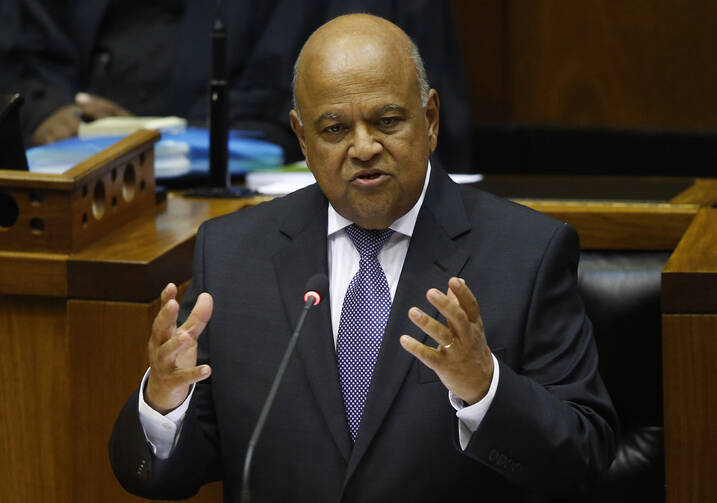The decision by South Africa’s National Prosecuting Authority on Oct. 11—amidst the ongoing crisis of the #FeesMustFall protests at the University of the Witwatersrand—to charge Minister of Finance Pravin Gordhan and two associates with fraud is significant to say the least. It has already resulted in major financial shockwaves on the Johannesburg Stock Exchange and threatens the strength of the South African currency. It has also resulted in widespread condemnation from just about everyone—from business executives to the South African Communist Party.
Saki Macozoma, Bobby Godsell and Thero Setiloane of Business Leadership South Africa observed that the nature of the charges and how they have been pursued “creates a strong perception that our prosecutorial institutions are being used for political ends.” The business leaders add, “In the current context, this cannot but be to our detriment as a country and is sure to hold us back as we seek to build an economy that addresses the triple headed Hydra of poverty, unemployment and inequality.”
Communist Party spokesperson Alex Mashilo said the action was “a pretext to have [Mr. Gordhan] removed from office and weaken the National Treasury’s struggle that he is leading against corruption and corporate capture.” He added that it seemed like the timing of such a move had “an eerie similarity with the events that unfolded between 2003 and 2007, when the timing of another prosecution against a senior politician [current President Jacob Zuma] appeared to be coordinated around a political calendar.”
Mr. Mashilo refers to the fact that the process has been on and off the agenda since last year, the case being conveniently shelved before this year’s local government elections. It is also worth noting that the terms of the case have been changed. There is no reference to a “rogue unit” in the South African Revenue Service but to finances relating to the accused’s—Ivan Pillay—pension payout and contract appointment to assist the South African Revenue Service.
This process is, according to legal experts like Pierre de Vos, quite within the law. It is certainly not an uncommon process in the last 22 years: White civil servants were encouraged to take early retirement to ease the process of affirmation action, but many were retained on temporary contracts to mentor new appointments.
What I find significant is that the move against Mr. Gordhan happens now, while the country is preoccupied with the #FeesMustFall protests at Witwatersrand University. As we’ve noted this has been a deeply divisive issue for students, lecturers, university administrations and the public at large.
But one thing is certain: If the Rand collapses, the chance of any scheme to radically reduce or eliminate tertiary education fees collapses with it. Given the shock the decision to charge Mr. Gordhan has caused, it seems unlikely the government will be able to eliminate tertiary fees, especially if the already weak economy continues its decline. And if the class of 2016 is unable to graduate because of the protests, it will have further disastrous effects on the South African economy and society. Essential services like education and public health will have no new teachers and health care professionals entering the field. This could lead to deeper crisis.
Similarly, those students who are able to repeat the academic year lost by possible closure of universities (as opposed to many who may be forced out of university completely due to lack of funds) will clog the system. Classes will double in size, creating massive pressure on education infrastructure. Many high school graduates may even avoid coming to university next year.
There is already a potential for economic and social crisis. The impending prosecution of Mr. Gordhan raises the specter that no sane and sober minister of finance will be on hand to manage the crisis. And there is the very real possibility of a new minister who will be in the pocket of President Zuma and his local and international cronies. Such a minister may well turn a blind eye to, oversee or actively assist in the state capture Mr. Gordhan has heroically resisted.
There is no evidence to say that the fees conflict at universities is in some way part of a Machiavellian master strategy to distract the public while state capture happens, a scheme to keep media busy while Mr. Gordhan and his colleagues are forced out of the Ministry of Finance. But the university disturbances have clearly served the interests of Mr. Zuma and his friends in the nation’s “security cluster” (police, military, intelligence services and their ministerial overlords) to initiate renewed plans to remove the troublesome Mr. Gordhan from circulation.
The suppression of the student protests, which is happening as violence escalates on both sides, may even give the powers a convenient pretext to introduce security clampdowns that could include suppression of media and restrictions on the rule of law. That move would further facilitate state capture and the consolidation of Zuma’s bloc within the ruling party ahead of the 2019 General Elections.
Anthony Egan, S.J., is one of America’s Johannesburg correspondents.








